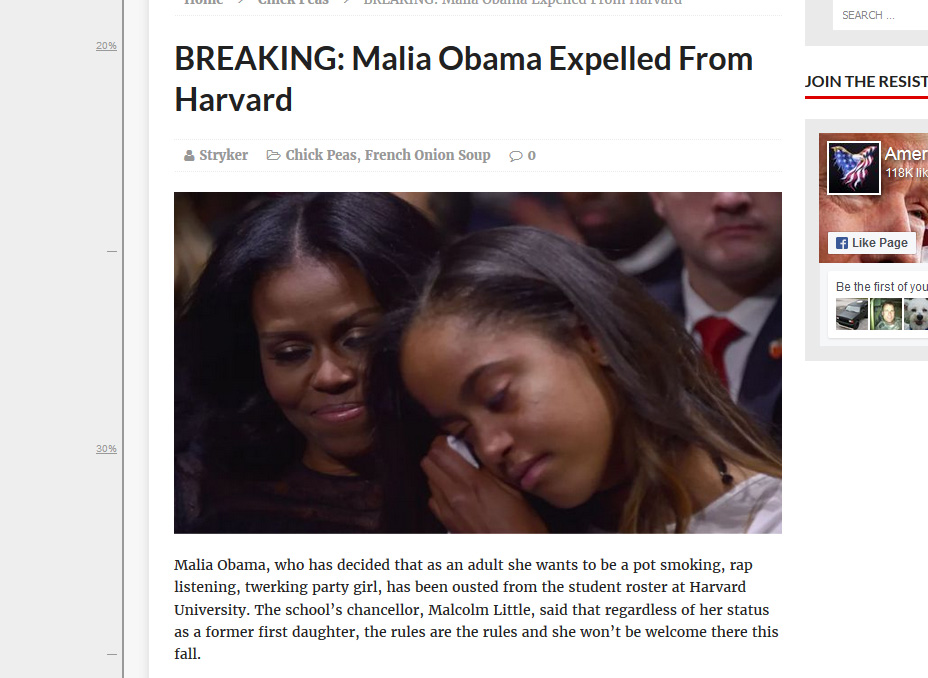The American right-wing media ecosystem seems happiest in opposition.

Barack Obama supplied eight years of largely imaginary outrages, as did Bill Clinton (not all of whose outrages were completely exaggerated). Hillary had her turn.
Years and years of rage at Democratic presidents, or Democratic presidential candidates, played well with the base — whole careers, and micro-industries, must have been founded on it.
But with Donald Trump in the White House, both houses of Congress controlled by Republicans, and no Democratic presidential candidate emerging for the better part of four years — you see the problem.
So posts like this one from thelastlineofdefense.org, which claims that ex-presidential daughter Malia Obama was expelled from Harvard, more or less on arrival, for vaping marijuana in a Boston hotel, aren’t surprising.
READ: Fake news: No, strangers can’t find you on Facebook by taking pictures of you on the street
The story itself is easily disposed of. The most obvious issue is that Malia doesn’t yet go to Harvard — she got accepted, then arranged to take a year off.
Once you read the story with even minimal rigour, other problems crop up. “Malcolm Little,” supposedly Harvard’s chancellor (and the disciplinarian in this little morality play) seems not to exist, though Malcolm Little was Malcolm X’s name before he became Malcolm X. Also, Harvard doesn’t have a chancellor. Also, Harvard’s drug and alcohol policy has nothing to say about off-campus drug use.
Also — when was the last time anyone was kicked out of Harvard for smoking pot? A very long time ago, apparently. Here’s an account of two students being let off with a reprimand back in April of 1965.
On the other hand, the story netted something on the order of 20,000 Facebook shares, so on some terms, it probably counts as a good day’s work from that point of view.
(The photo is of Malia listening to her father’s farewell address.)
Chelsea Clinton, who may or may not run for office at some future point, has also come in for some preliminary venom.
READ: The War on Easter that wasn’t
In fake news news:
- In Buzzfeed: Craig Silverman makes a case that TrueTrumpers.com, a pro-Trump site that seems to be based in Georgia (the ex-Soviet Georgia) “may be the worst thing on the Internet.” The site consists more or less entirely of fabricated atrocity propaganda targeting Muslims. Reader engagement consists of polls demanding to know whether Muslims responsible for the imaginary atrocities should be hanged. “True Trumpers shows that as long as you have a big Facebook page and can craft rage-inducing headlines and thumbnails, your website can literally have almost zero content and still make money,” Silverman says. (We’d link to it directly, but it has ruthless popup windows — be warned.)
- Buzzfeed also looks at an Australian fake news story claiming that a Muslim MP there refused to lay a wreath at a war memorial (she was laying a wreath at a different war memorial at the time, it turned out), and the outrage machine that geared up in response.
- Russian journalist Ilya Kizirov explains what it was like to work for an independent news organization in Moscow that was brought under the Kremlin’s direct control. He and his colleagues found that the professional credibility they had built as journalists was being expended by the state, which was now using them as propagandists. “The Kremlin’s disinformation campaign depends on such journalists,” he writes. “Not on people who want to change the world order. But rather, on those who hope that their friends and relatives don’t see them on TV.”
- The New York Times Magazine looks at Facebook’s attempts to grapple with the degree to which its news feed has become a vehicle for disinformation, fake news and propaganda. Facebook seems to have become a lot humbler about the problems its platform has helped create, but it’s not clear that it’s much closer to a solution. A long read, worth your time.
- British Conservative MP Damian Collins is nervous about the British election’s vulnerability to fake news spread on Facebook, the Guardian reports. “Nobody at Facebook is checking what information is being put out there,” he warns. “You only need a few hundred people to be sharing a message a lot for it to spread incredibly quickly.”
- Computer scientist Krishna Bharat proposes a system under which algorithms would try to detect trending fake news stories (his example is the false account during the U.S. election that the Pope had endorsed Donald Trump) and flag them for human editors to check. “The biggest challenge to stopping fake news is not technical,” he argues. “It is operational willingness.“
- The CBC explains the “unique challenges” in dealing with social media-driven fake news in the Philippines. Connectivity is expensive and slow, but Facebook is fast and free, which means it’s hard for readers to do independent fact-checking. The result is a closed box where vicious fake stories about public figures flourish.
READ: London Pakistanis were celebrating 2009 cricket win, not Paris terror attack this week




Comments